


This article highlights essential self-care tips for managing coronary artery disease (CAD), focusing on personalized strategies that can significantly improve your heart health. Are you concerned about your cardiovascular well-being? You’re not alone, and there are steps you can take to feel more empowered.
Key recommendations include:
Each of these strategies plays a vital role in helping you take proactive control of your cardiovascular health.
In addition to these recommendations, remember that you’re supported throughout this journey. Seeking help and guidance can make a difference, and you deserve to feel confident in managing your health. Together, we can work towards a healthier future for your heart.
Understanding coronary artery disease (CAD) can feel overwhelming, especially when it comes to the intricacies of self-care management. Yet, the path to improved heart health is not only possible but also empowering. This article explores ten essential self-care tips that can greatly enhance the quality of life for those managing CAD. Have you considered that the key to transforming your heart health might be found in simple, actionable strategies? By examining personalized approaches—from nutrition and exercise to stress management and community support—you will uncover ways to take proactive steps toward a healthier heart and a more fulfilling life.
At Amavita Heart and Vascular Health, founded by Dr. Pedro Martinez-Clark, we are deeply committed to providing tailored care for individuals facing coronary artery disease (CAD). Our practice prioritizes a patient-centered approach, blending advanced medical techniques—such as cardiac catheterization, coronary revascularization, drug-coated balloon therapy, and minimally invasive procedures—with compassionate care. This ensures that each individual receives personalized strategies for coronary artery disease self-care that align with their unique wellness needs, ultimately enhancing their quality of life and health outcomes.
By focusing on personalized treatment strategies, we empower individuals to take an active role in coronary artery disease self-care and managing their heart health. As Dr. Jason Allen, an interventional cardiologist, notes, 'This technology represents a significant advancement in our ability to manage complex coronary artery disease.' We are proud to serve a diverse clientele, including underserved communities in Miami-Dade County, ensuring that our communication is culturally sensitive and accessible in English, Spanish, and Creole. This holistic approach not only fosters individual engagement but also cultivates a collaborative environment that promotes better cardiovascular care.
Furthermore, through Amavita Research Services, we engage in innovative clinical trials aimed at advancing cardiovascular care. This reflects our dedication to implementing cutting-edge outpatient strategies that enhance patient experience and outcomes. We invite you to reach out and discover how we can support you on your journey to .
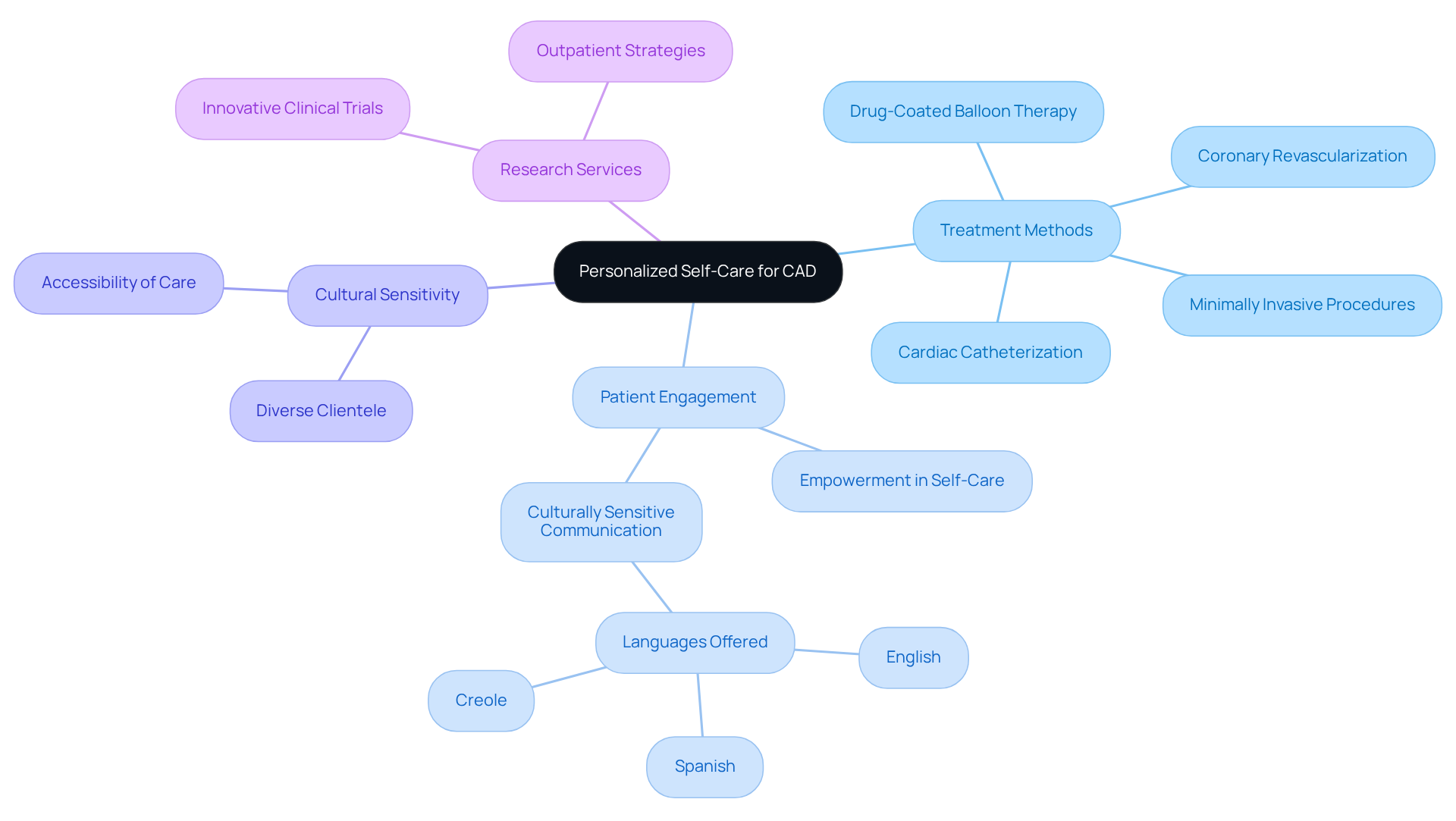
Embracing a heart-healthy diet is essential for effective coronary artery disease self-care. It’s understandable to feel overwhelmed by dietary changes, but focusing on certain food groups can make a significant difference in your health. Here are some important categories to consider:
By focusing on these food groups, you can improve your [cardiovascular health](https://amavita.health/news/dr-pedro-martinez-clark-leads-the-charge-in-cardiovascular-health) and enhance your coronary artery disease self-care more effectively. Nutritionists stress that a balanced diet, abundant in these vital foods, is crucial for lowering the occurrence of cardiovascular issues and enhancing overall vascular health. However, challenges such as food insecurity and targeted marketing of unhealthy foods can impede adherence to these dietary recommendations. Remember, it’s okay to seek help and support as you navigate these changes—your health journey is important, and you are not alone.
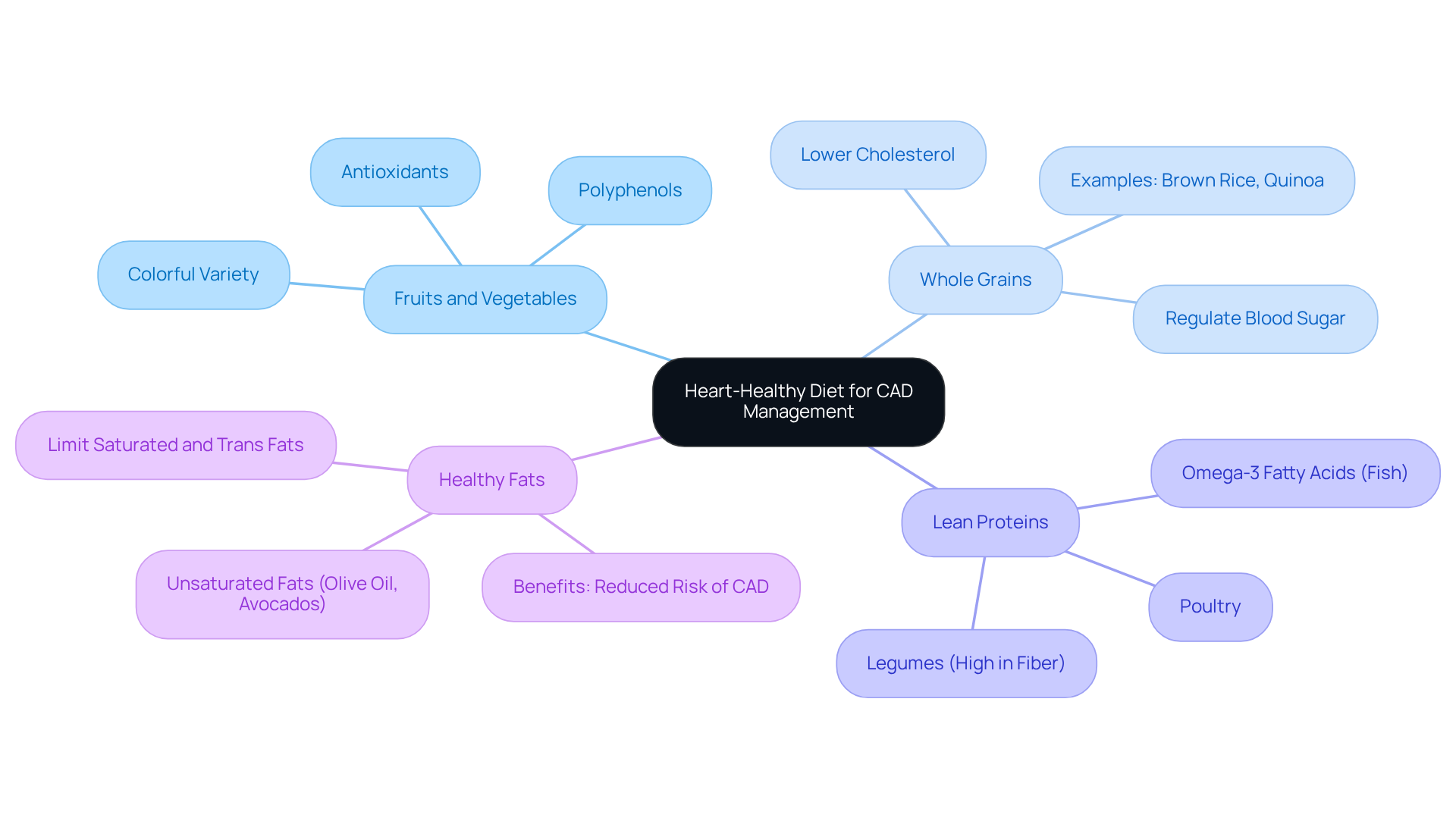
Boosting physical activity is crucial for effectively managing coronary artery disease self-care. It’s understandable to feel overwhelmed, but incorporating movement into your routine can make a significant difference. Here are some gentle strategies to consider:
By integrating these exercise strategies, you can enhance your cardiovascular fitness and overall well-being. It’s reassuring to know that consistent physical activity is associated with a 21% decrease in the risk of coronary artery issues and stroke. This highlights the importance of an active lifestyle in managing heart health. You are not alone in this journey; taking these steps can lead to a .
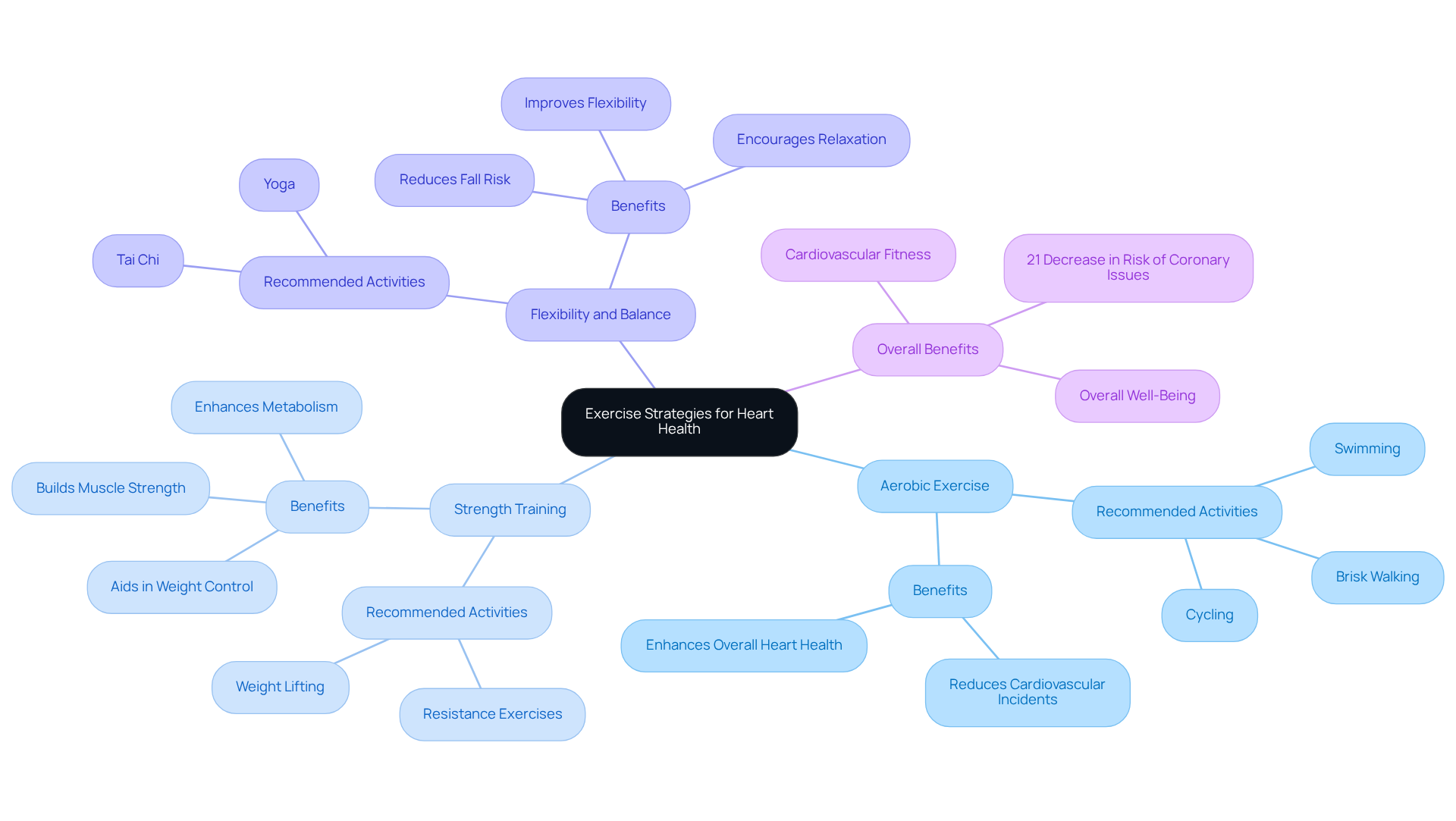
Maintaining a healthy body weight is essential for coronary artery disease self-care, and it’s important to approach this journey with care and support. Here are some effective strategies to consider:
By applying these methods, you can achieve a healthier weight, which is associated with a significant decrease in the risk of cardiovascular issues, ultimately supporting coronary artery disease self-care. Remember, effective weight loss initiatives tailored for cardiovascular patients often include aspects of coronary artery disease self-care. It’s crucial to cultivate a nurturing environment and embrace continuous learning as you navigate this path towards better health.

Quitting smoking is essential for anyone managing coronary artery disease, offering numerous health benefits that can greatly enhance your well-being:
To successfully quit smoking, we encourage you to , support groups, or cessation programs. These interventions have proven effective in helping individuals overcome addiction and improve their cardiovascular health, which supports the importance of coronary artery disease self-care alongside the advanced, minimally invasive treatments provided at Amavita. Remember, you are not alone on this journey, and we are here to support you every step of the way.
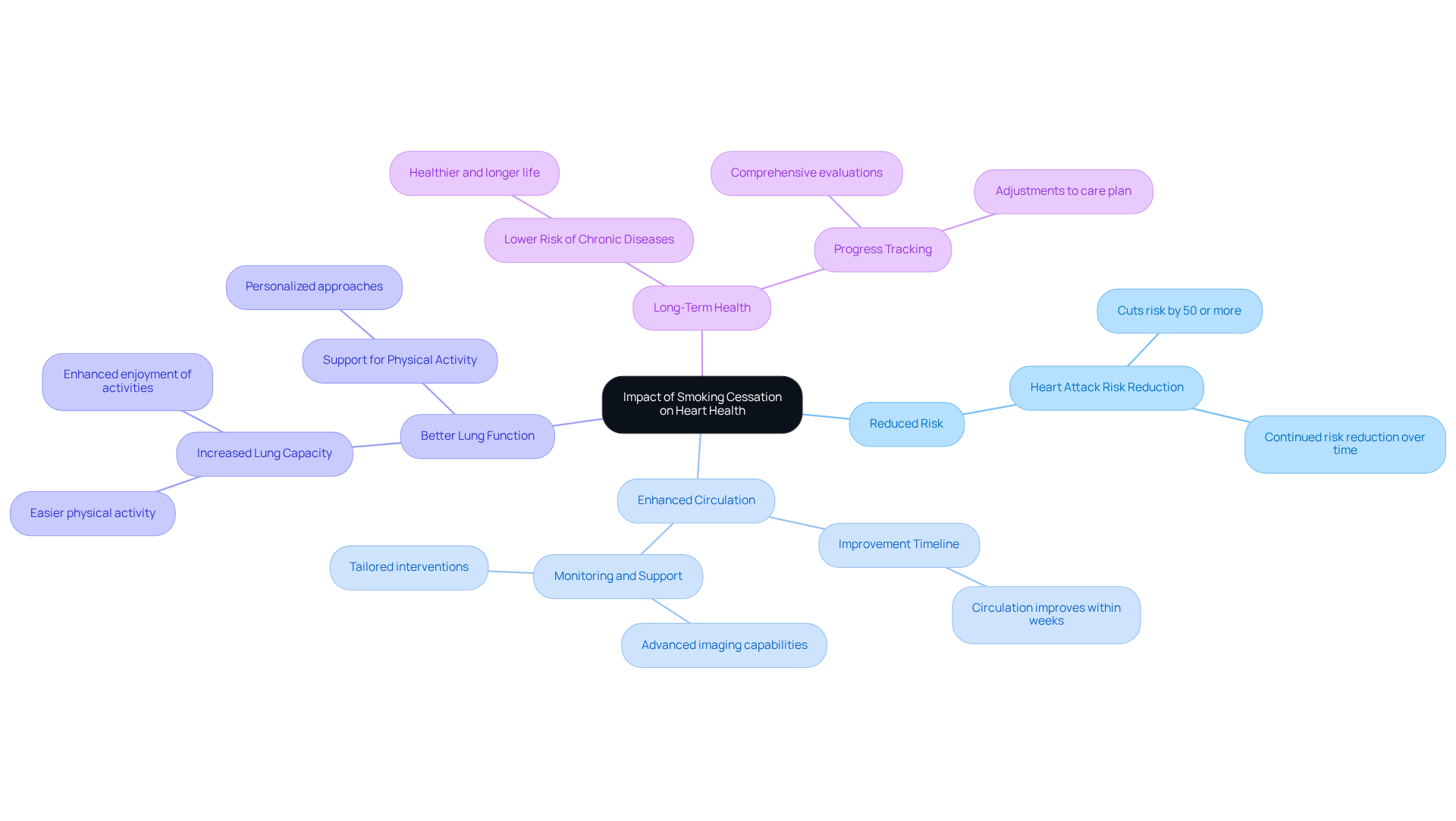
Managing stress is vital for your heart health, especially for those involved in coronary artery disease self-care. Here are some effective techniques that can help you feel better:
By embracing these strategies, you can improve your emotional well-being and effectively engage in coronary artery disease self-care to support your heart health. Remember, you are not alone in this journey, and seeking support is a positive step towards better health.
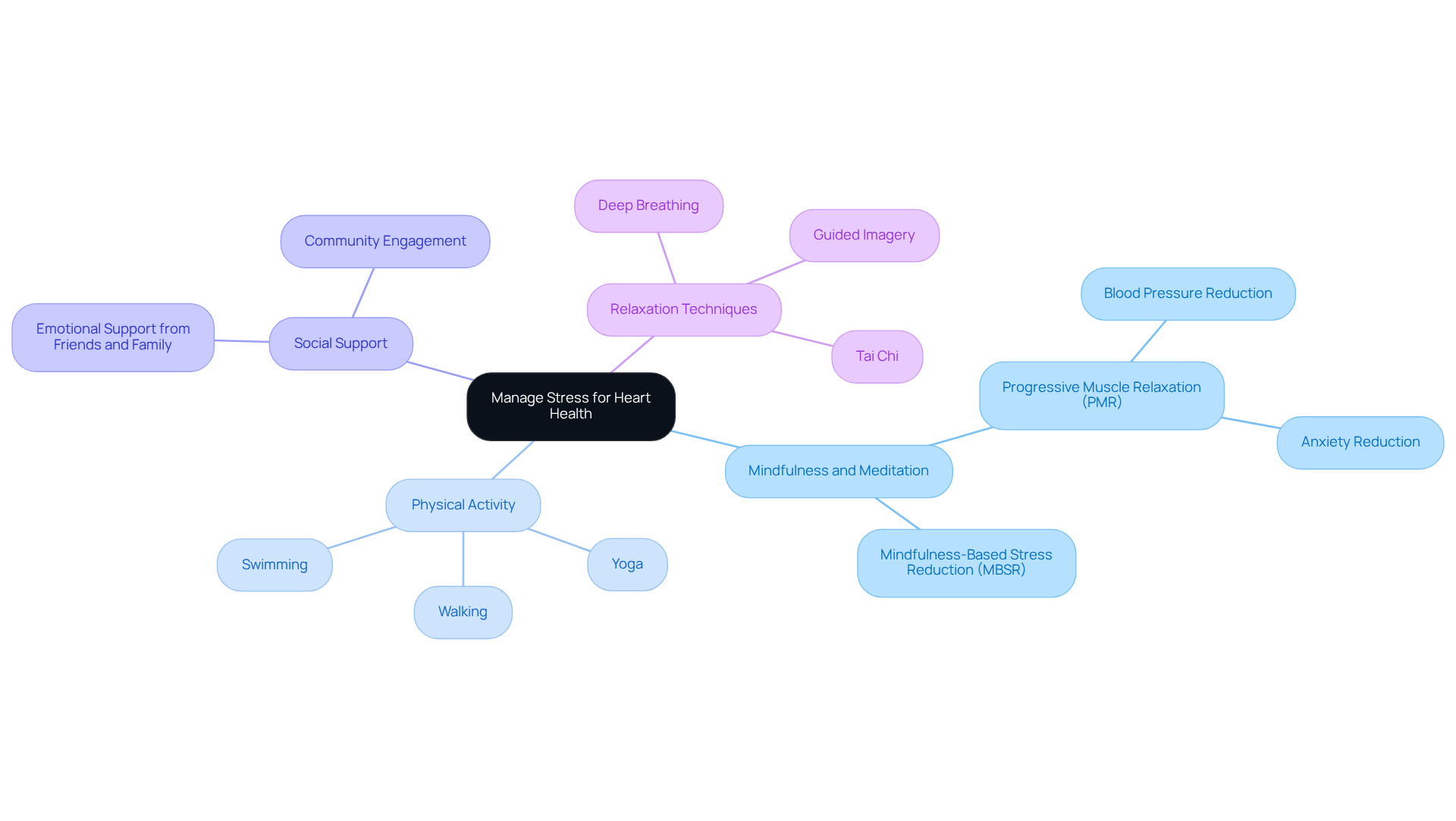
Arranging routine medical check-ups is essential for effective coronary artery disease self-care. These check-ups can help alleviate concerns and provide reassurance about your heart health. Key components include:
Cardiovascular issues are the primary reason for mortality worldwide, with an individual in the U.S. succumbing to a cardiac arrest every 39 seconds. By prioritizing routine medical check-ups, you can stay informed about your cardiovascular condition and make essential modifications to your coronary artery disease self-care. As Jordan Schmitt states, "Regular medical check-ups play a vital role in identifying potential risk factors and detecting early signs of cardiovascular disease." Furthermore, the case study on 'Early Detection of Risk Factors' emphasizes how regular check-ups can lead to timely interventions, highlighting the significance of monitoring cardiovascular well-being.
Moreover, addressing mental well-being is crucial, as it greatly influences overall cardiovascular health. Amavita offers various programs, such as the Optimal Program for comprehensive hormone optimization with heart health monitoring, priced at $416/month, and the Complete Longevity Medicine program at $625/month, which includes AI-powered cardiac analysis and monthly check-ins. We invite you to reach out and discuss how these programs can .

Adhering to prescribed medications is essential for effective coronary artery disease self-care management. It's important to understand that each medication has its purpose and benefits. Did you know that, as Khatib noted, the rate of nonadherence to at least one medication used in the secondary prevention of CAD is 43.5%? This statistic highlights the critical need for awareness among patients.
To help remember to take medications on time, can be incredibly beneficial. Consider using:
Establishing a specific time each day for medication intake can create a comforting routine that supports your health journey.
Regular discussions with healthcare providers are also vital. Scheduling these reviews allows you to address any concerns and ensures that you are on the right path. This proactive approach can lead to essential modifications that enhance your treatment.
Involving family members or caregivers in your medication management can significantly enhance adherence. Their support can provide additional encouragement and accountability, making the process feel less overwhelming.
Additionally, utilizing medication tracking apps can help monitor intake and remind you of doses. These tools can be a great way to stay organized and committed to your health.
By prioritizing coronary artery disease self-care, including medication adherence, you can significantly improve your health outcomes and reduce the risk of complications. Remember, you are not alone in this journey; support is available, and taking these steps can lead to a better quality of life.
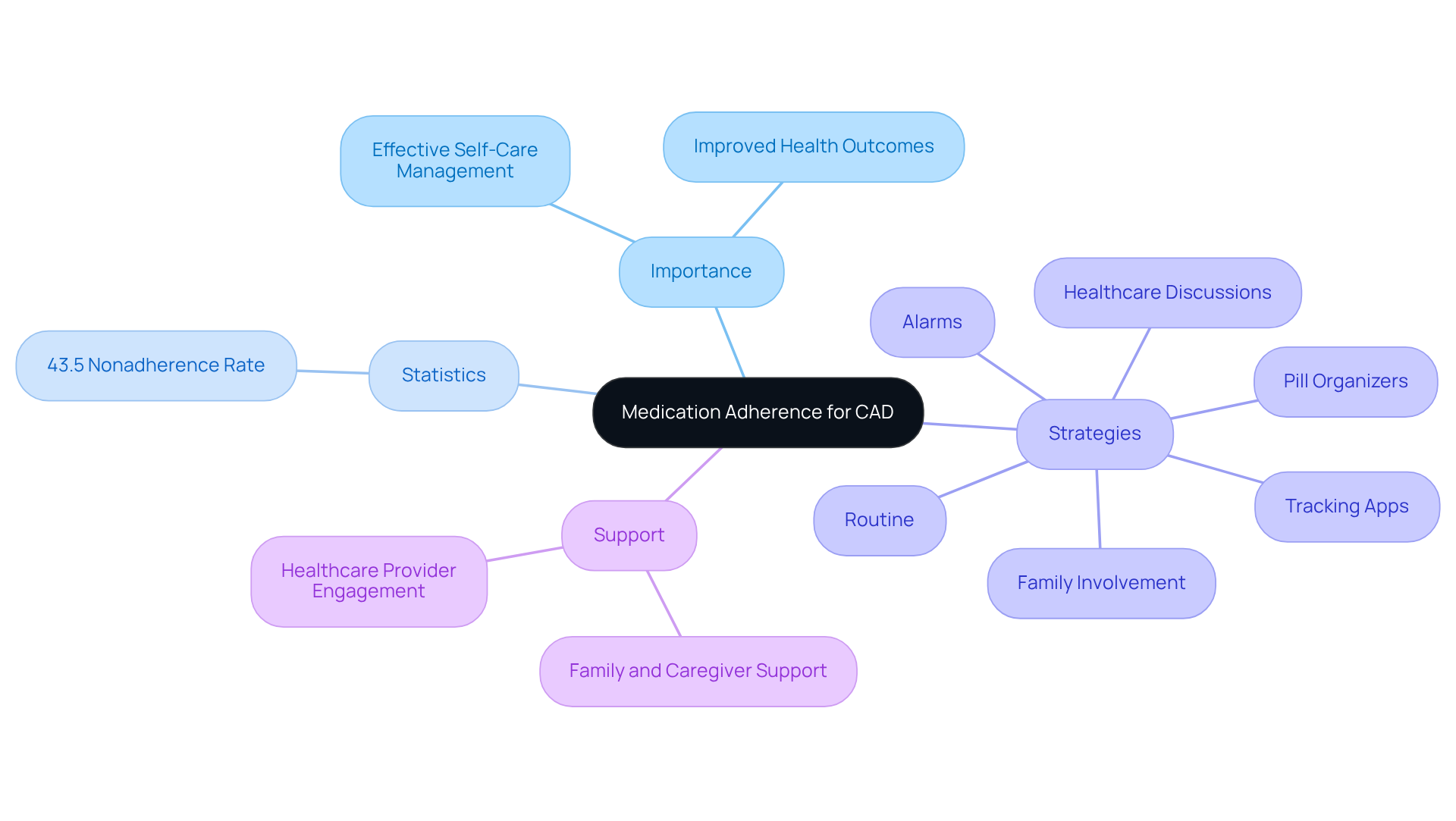
Participating in community support can significantly enhance coronary artery disease self-care management, especially when integrated with comprehensive programs like Amavita's CardioElite™. The benefits are profound:
By leveraging community support alongside the innovative CardioElite™ program, which integrates advanced AI, AHA certification, and staff training, patients can enhance their efforts in coronary artery disease self-care, leading to improved overall health and quality of life. Remember, you are not alone on this journey—support is available, and together we can work towards a healthier future.
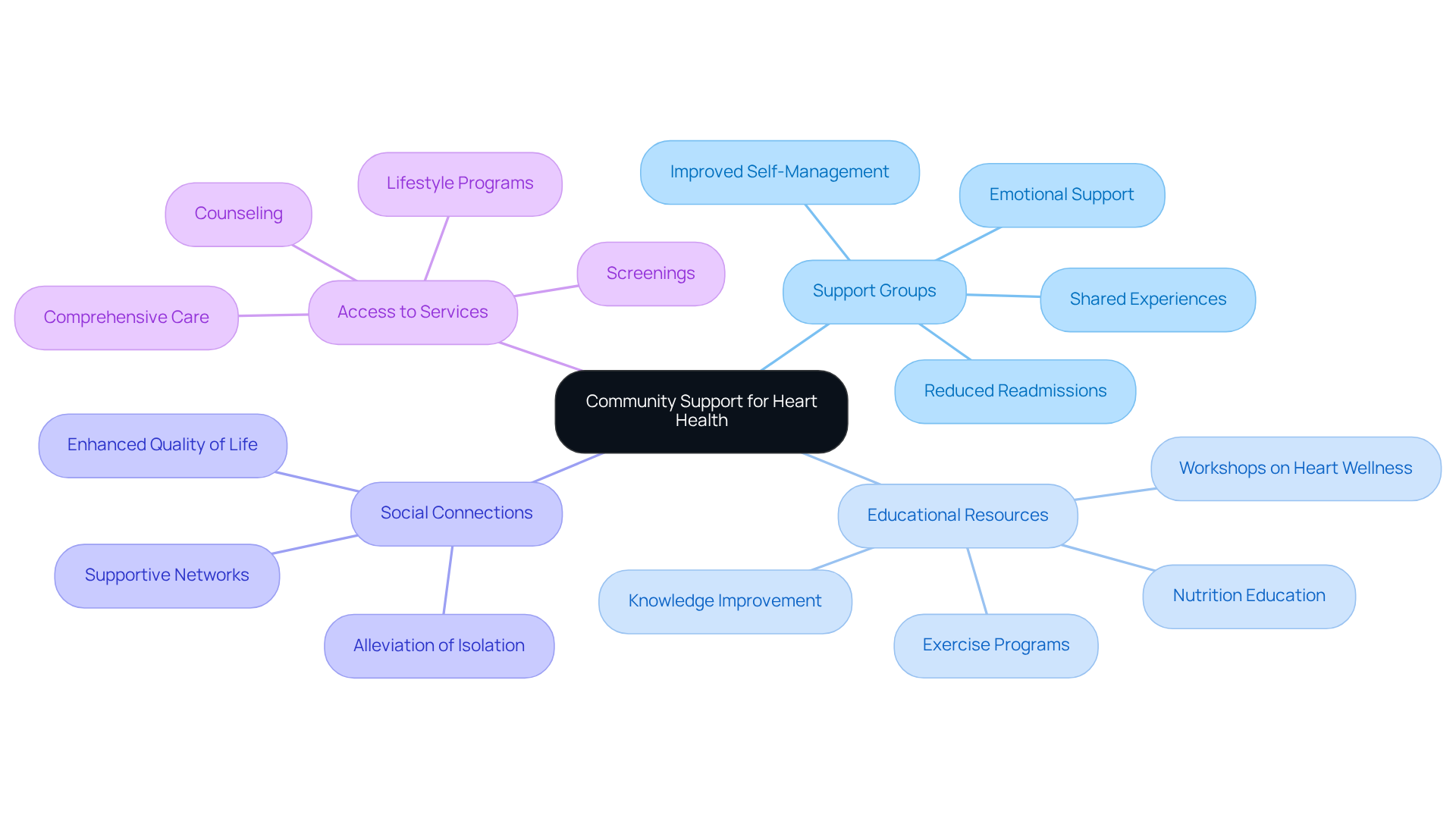
Understanding your self-care is a vital step towards effective health management. It’s natural to feel concerned about your health, and recognizing these key risk factors can empower you to take charge of your well-being:
By recognizing and understanding these risk factors, you can take proactive steps in your self-care journey. This awareness leads to better management of coronary artery disease self-care and enhances your overall health. Remember, you are not alone on this journey; seeking support and guidance is a courageous step towards a healthier life.

Embracing personalized self-care strategies is essential for effectively managing coronary artery disease (CAD) and enhancing overall heart health. By prioritizing individualized approaches, you can take proactive steps towards improving your well-being, ensuring that your unique health needs are met with tailored solutions. This commitment to personalized care not only empowers you but also fosters a deeper understanding of your cardiovascular health.
The article highlights several key self-care tips that can make a significant difference in your journey. Consider the importance of:
Each of these elements plays a crucial role in supporting you on your path to better heart health. Remember, comprehensive self-care is a multifaceted approach that requires dedication and awareness.
Ultimately, the journey to managing coronary artery disease is not one that you need to take alone. By utilizing available resources, seeking support, and actively engaging in self-care practices, you can significantly enhance your quality of life and reduce the risk of complications. Taking these steps not only contributes to your personal health but also fosters a supportive community that prioritizes heart health. It’s imperative to act now for a healthier future—together, we can create a path towards better heart health.
What is the focus of Amavita Heart and Vascular Health?
Amavita Heart and Vascular Health focuses on providing personalized care for individuals facing coronary artery disease (CAD) through a patient-centered approach that combines advanced medical techniques with compassionate care.
What advanced medical techniques are utilized at Amavita?
The practice employs techniques such as cardiac catheterization, coronary revascularization, drug-coated balloon therapy, and minimally invasive procedures.
How does Amavita empower individuals in managing their heart health?
Amavita empowers individuals by promoting personalized self-care strategies for coronary artery disease, encouraging them to take an active role in managing their heart health.
What languages does Amavita provide services in?
Amavita offers services in English, Spanish, and Creole to ensure culturally sensitive communication, particularly for underserved communities in Miami-Dade County.
What role does Amavita Research Services play in cardiovascular care?
Amavita Research Services engages in innovative clinical trials aimed at advancing cardiovascular care and implementing cutting-edge outpatient strategies to enhance patient experience and outcomes.
What dietary changes are recommended for managing coronary artery disease?
A heart-healthy diet should include a variety of fruits and vegetables, whole grains, lean proteins, and healthy fats while avoiding trans fats and limiting saturated fats.
Why are fruits and vegetables important for heart health?
Diets rich in fruits and vegetables, especially those high in antioxidants and polyphenols, are linked to a lower likelihood of cardiovascular issues.
What types of proteins are beneficial for individuals with coronary artery disease?
Beneficial protein sources include fish high in omega-3 fatty acids (like salmon and mackerel), poultry, and legumes, which help manage cholesterol and inflammation.
How much physical activity is recommended for heart health?
It is recommended to engage in at least 150 minutes of moderate-intensity aerobic activity each week, along with resistance exercises at least twice a week.
What are some gentle exercise strategies for individuals with coronary artery disease?
Gentle exercise strategies include aerobic activities like brisk walking or swimming, strength training, and flexibility exercises such as yoga or tai chi.
What are the benefits of physical activity in managing coronary artery disease?
Consistent physical activity is associated with a significant reduction in the risk of cardiovascular incidents and enhances overall heart health.